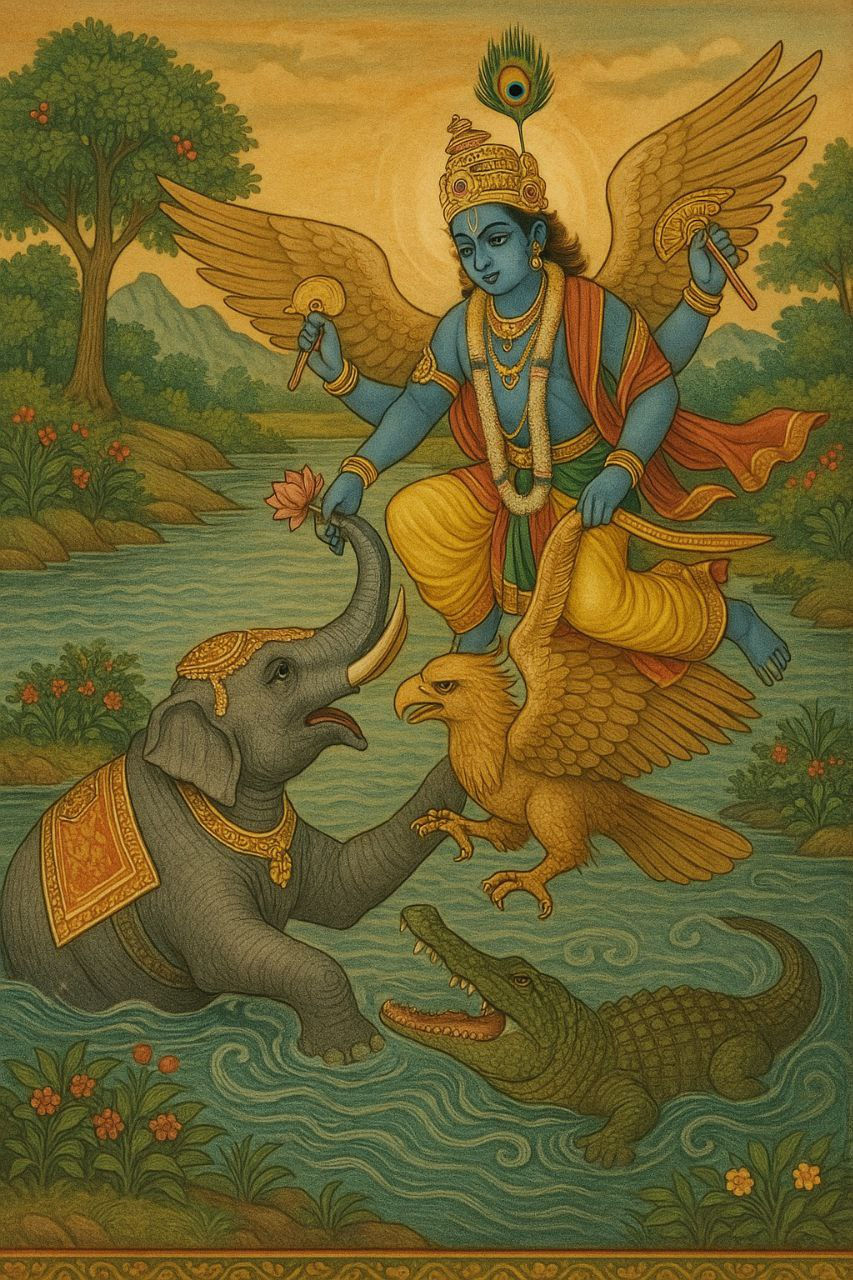The Descent of the Sacred Ganga: The Legend of Bhagiratha
- Dheemahi Connect

- Jun 9, 2025
- 4 min read
Long ago, when the Earth was young and the heavens vibrant with celestial glory, there lived a mighty mountain king—Himavan, guardian of the snowy Himalayas. From his union with the noble queen Mena were born two radiant daughters: Ganga, whose laughter echoed like crystal streams, and Uma, whose austere penance would one day bind her to Lord Shiva himself.

Ganga, luminous and free, was gifted to the heavens by the Devas, where she flowed in divine brilliance, gracing the celestial realms with her sacred presence. Uma chose the path of tapas, becoming Parvati, the eternal consort of Mahadeva.
Far below, in the realm of men, a sovereign of great fame ruled the city of Ayodhya—King Sagara of the Ikshvaku dynasty, a flame in the royal lineage that traced its roots to the Sun God. Though blessed with vast wealth and unshakable valor, Sagara yearned for a worthy heir. With two queens—Keshini and Sumati—he performed severe penance, invoking the favor of Sage Bhrigu.
The sage’s blessings bore fruit—Keshini gave birth to a son named Asamanja, while Sumati, by divine boon, bore sixty thousand sons, as radiant and fierce as the flames of a ritual fire.
Time flowed on. Asamanja, though born of noble blood, turned cruel and destructive. His misdeeds darkened the royal court, and with a heavy heart, Sagara banished him, preserving only his virtuous son Amshuman.
Later, the king resolved to perform the grand Ashwamedha Yajna, a horse sacrifice to proclaim his sovereignty. But the divine stallion vanished, stolen by none other than Indra, the king of gods, jealous of Sagara's rising glory. Furious, Sagara dispatched his sixty thousand sons to retrieve the steed.
They dug deep into the bowels of the Earth, splitting mountains and uprooting forests, their wrath shaking the worlds. The gods trembled at their fury and turned to Brahma, who assured them: “Fear not, for Vishnu himself, in the form of the sage Kapila, shall restore balance.”
In the netherworld, the princes found the stolen horse grazing peacefully beside Kapila, seated in serene meditation. Mistaking the sage for the thief, they unleashed their fury. Kapila opened his divine eyes, and in a blaze of pure energy, the sons of Sagara were reduced to ash.
Time passed. The sons never returned, and Sagara’s grief grew heavy. He sent Amshuman, the noble prince, on a quest to find his uncles. Guided by the four celestial elephants who guard the corners of the Earth, Amshuman journeyed to Patalaloka, where he beheld the terrible truth. There, he met Garuda, the mighty eagle, who said: “Their salvation lies not in fire or prayer, but in the touch of the sacred Ganga. Only her divine waters can cleanse their sins and lift them to heaven.”
Amshuman returned with the horse, and the yajna was completed. Yet, the king could not summon Ganga to the Earth. He ruled for thirty thousand years, his heart ever heavy with unfulfilled longing.
After Sagara, Amshuman took up the throne. He was righteous and wise, but even his deep penance failed to move the heavenly river. His son Dilipa too sought divine aid, offering countless yajnas, but Ganga remained beyond reach. Generations passed.
Then rose Bhagiratha, the hero of our tale.
He was not just a king—but a legend in human form. With a heart burning with purpose and devotion, Bhagiratha abdicated his throne and ventured into the wilderness. Amid the sacred groves of Gokarna, beneath ancient trees whispering with wind, he stood in fierce penance, unmoved by time or torment, for a thousand divine years.
Brahma, pleased by his resolve, appeared and said, “Your penance is worthy, Bhagiratha. Ganga shall descend—but her force is terrible. None on Earth can withstand her. Only Lord Shiva, the eternal anchor of the cosmos, can receive her on his matted locks.”
With renewed resolve, Bhagiratha began anew—this time meditating upon the great Mahadeva. For a year he stood, unmoving, breath still, mind fixed. And Lord Shiva, ever compassionate to the devoted, emerged from the shadows of Mount Kailasa, blessing the king. “Let Ganga descend,” he said, “and I shall bear her fury.” At last, from the heavens, with thunderous roar and cascading brilliance, Ganga leapt from the skies, proud and unstoppable, like a thousand waterfalls falling at once. But Shiva, smiling gently, caught her within his tangled hair, taming her arrogance. For ages, she wandered lost in the labyrinth of his locks—until, moved by Bhagiratha’s plea, the Lord released her through a single curl.
From that celestial trickle flowed Bindusaras, the sacred spring, and from there, seven divine streams were born—three flowing east, three west, and one that followed Bhagiratha.
As she flowed behind his chariot, sanctifying every stone and forest, the gods watched in reverence. But when she reached the ashram of Sage Jahnu, her waters disturbed his meditation. In divine wrath, he drank her whole.
Terrified, Bhagiratha prayed again. Moved by his humility, the sage released Ganga from his ear. From that moment on, she was known as Jahnavi. At last, after centuries of struggle, Ganga reached the ashes of the sons of Sagara. As her sacred waters touched them, a miracle occurred—their souls, long trapped in darkness, rose to Swarga, liberated and luminous. Brahma appeared once more, blessing Bhagiratha and declaring: "Because of your unshakable will and boundless devotion, the Earth has received the touch of the heavens. From this day forth, this river shall be known as Bhagirathi, born of your penance.”
And thus, the celestial Ganga, born in heaven, flowed on Earth, cleansing generations, blessing the land, and carrying the story of Bhagiratha—a tale of sacrifice, perseverance, and divine grace.









Comments